Watercooler Wednesdays: House of the Dragon & The Rings of Power
Watercooler Shows, the trending series that everyone talks about the next day at the office, around the water cooler. Watercooler Wednesdays seeks to be a (critical) guide through the VoD maze: from masterpiece series to guilty pleasures, and from blockbusters that keep you on the edge of your couch to hidden gems; if it leads to binging, then it’s exactly what we’re looking for.
Our series picks for September once again fall under the sign of streaming wars, this time HBO vs. Amazon. More than just a coincidence — Amazon released the first two episodes at once to catch up after HBO stole the lead in the last week of August —, The Rings of Power and House of the Dragon are now neck and neck on released episodes and about halfway through the season. For the pre-streaming (or torrent) TV nostalgics, it may seem like we’re back in the days of prime-time rating battles, when TV networks were fighting over the same time slot to air their doctor/lawyer/cop shows. Of course, the competition is symbolic, even though both productions run on the same corridor, that of high fantasy, with forerunners who must not be put to shame (LOTR and GOT), highly respected authors (J.R.R. Tolkien and George R.R. Martin) and, inevitably, legions of fans ready to criticize the slightest deviations from the source material or lament that it doesn’t live up to previous productions.
In this regard, it’s clear that House of the Dragon has the upper hand because the source material was adapted for the screen by the source itself – somewhat to the disappointment of G.R.R. Martin’s readers given that the success of the Game of Thrones universe seems to prevent him from finishing the A Song of Ice and Fire saga (the fifth volume of the monumental heptalogy that Martin worked on for 30 years was released in 2011!). In the meantime, GOT has ended (judging by the quality of the last few seasons, I’d say the author has bamboozled us about the progress on the missing books), and Martin has started a prequel, Fire and Blood now adapted into House of the Dragon.
The Rings of Power is also a prequel – whatever, the full title is The Lord of the Rings: The Rings of Power, because why not snatch some respectability from a critical/box-office superhit since we spent 250 million dollars on the copyright. The stupid title, however, is the least of the problems for what should be the most expensive series failure. It all started in 2017 when Jeff Bezos (head of Amazon and fan of Tolkien’s writings) got personally involved in the project, envious of the success of HBO-GOT. The business logic – we need market share in the fantasy market, consumers want dragons and princesses – does not necessarily have to fail, but here it happened in an epic way.
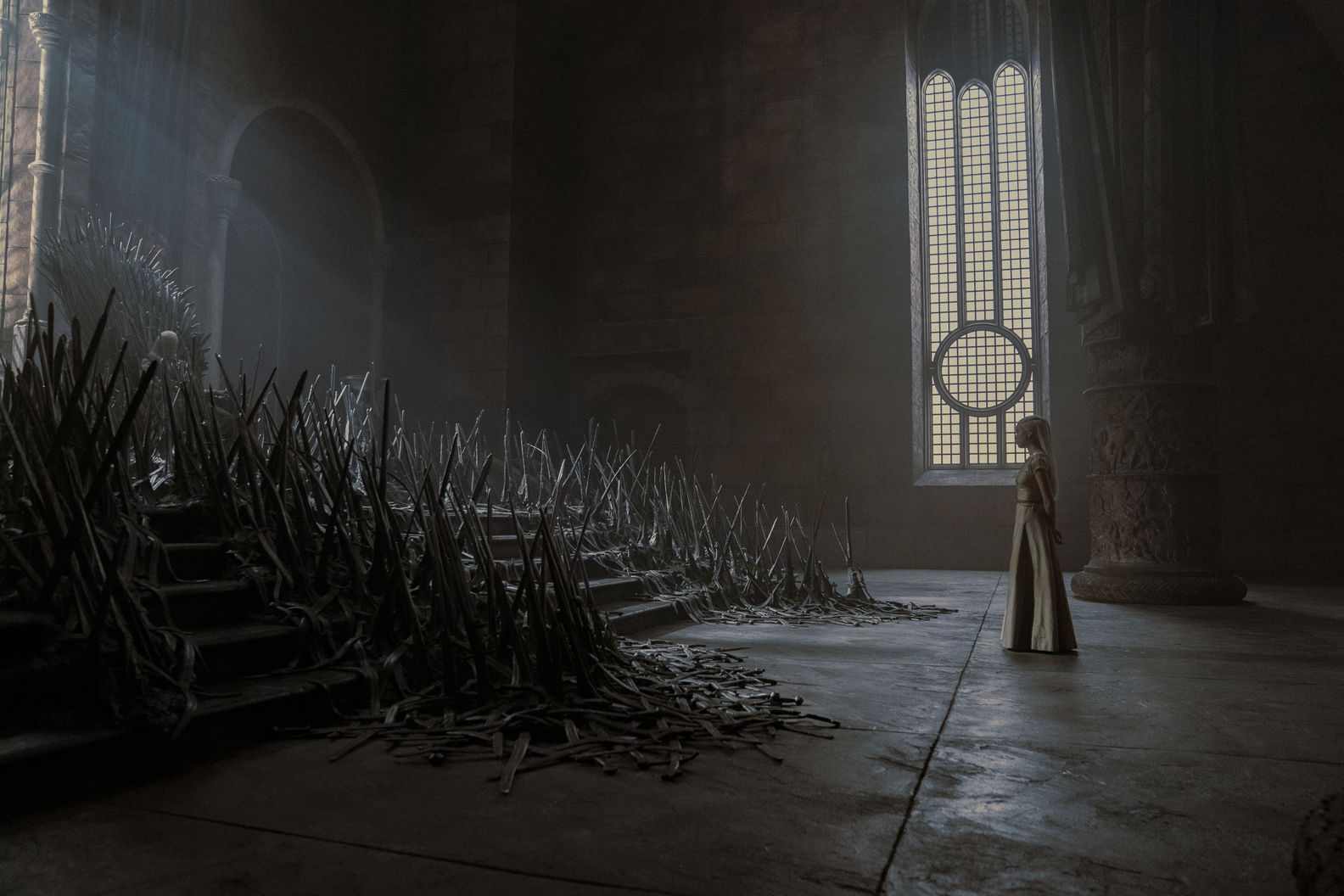
House of the Dragon (Ryan J. Condal, George R.R. Martin, 2022)
At the end of the last episode of Game of Thrones, the main characters left alive scattered every which way with a crooked little grin on their face – a silent promise that HBO will quickly hatch the goose with golden eggs for some spin-offs. Fortunately, House of the Dragon has no connection whatsoever with the “beloved” GOT characters.
No one would turn down a series with Arya, Tyrion, etc., no matter how weak it was (and it most likely would be weak) but GOT’s great strength has always been George R.R. Martin’s writing. Inspired by Tolkien and frustrated by his epigones, Martin is the one who brought high fantasy literature down to earth, anchoring his characters in psychology and sociology. The key difference was never about the means of expression (sex and violence, as Tolkien fanatics complain on the forums) but about all the shades of gray that Martin knows how to find between “light” and “dark”, the two poles towards which characters in this literary genre inevitably migrate. But for the protagonists of GOT, all this inner balance was already exhausted; after so many betrayals, acts of revenge, and forgiveness, those left at the end were inevitably “the good guys”, there was no more room to explore the gray.
So the novelist and HBO set their sights several centuries before the events adapted in GOT. A hundred years after the union of the Seven Kingdoms, the Targaryen royal house – otherworldly lords from the East – is going through a succession crisis. There might be different characters, but the social mechanisms and psychological conditioning are the same: essentially manifestations of individual freedom vs. duty, augmented by how high or low you are on the social ladder. And the main characters are right at the top, one move away from being number one – number two is obviously the most dangerous position in any hierarchy (when you play the game of thrones you either win or you die).
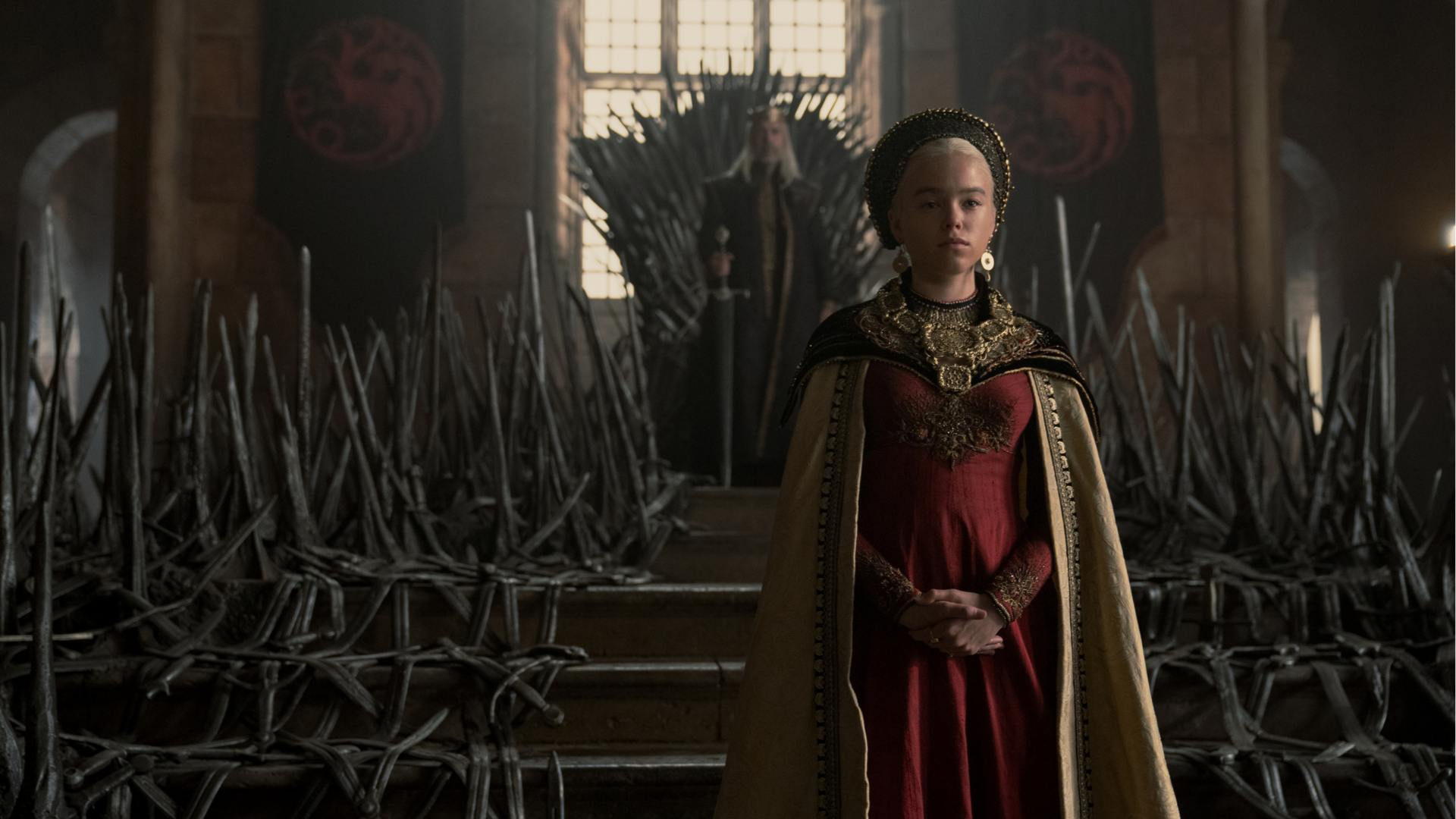
Number one here is Viserys I (Paddy Considine), who, in turn, is not the most legitimate king; he was voted by the patriarchal nobility over a female cousin who would have been more entitled to inherit the throne (and apparently a more capable warrior). Left a widower and without male successors, Viserys takes the plunge a few years after his own coronation: he announces that his daughter, Rhaenyra, will be the next ruler. Forced by circumstances, Viserys single-handedly steps down to the second rung of the ladder: since we’re accepting queens, why don’t we reconsider the vote from a few years ago? That’s what half of the court thinks. Lucky for the king, the other half competes in marriage proposals for the future queen – one way or another, the patriarchy still hopes to have the last word.
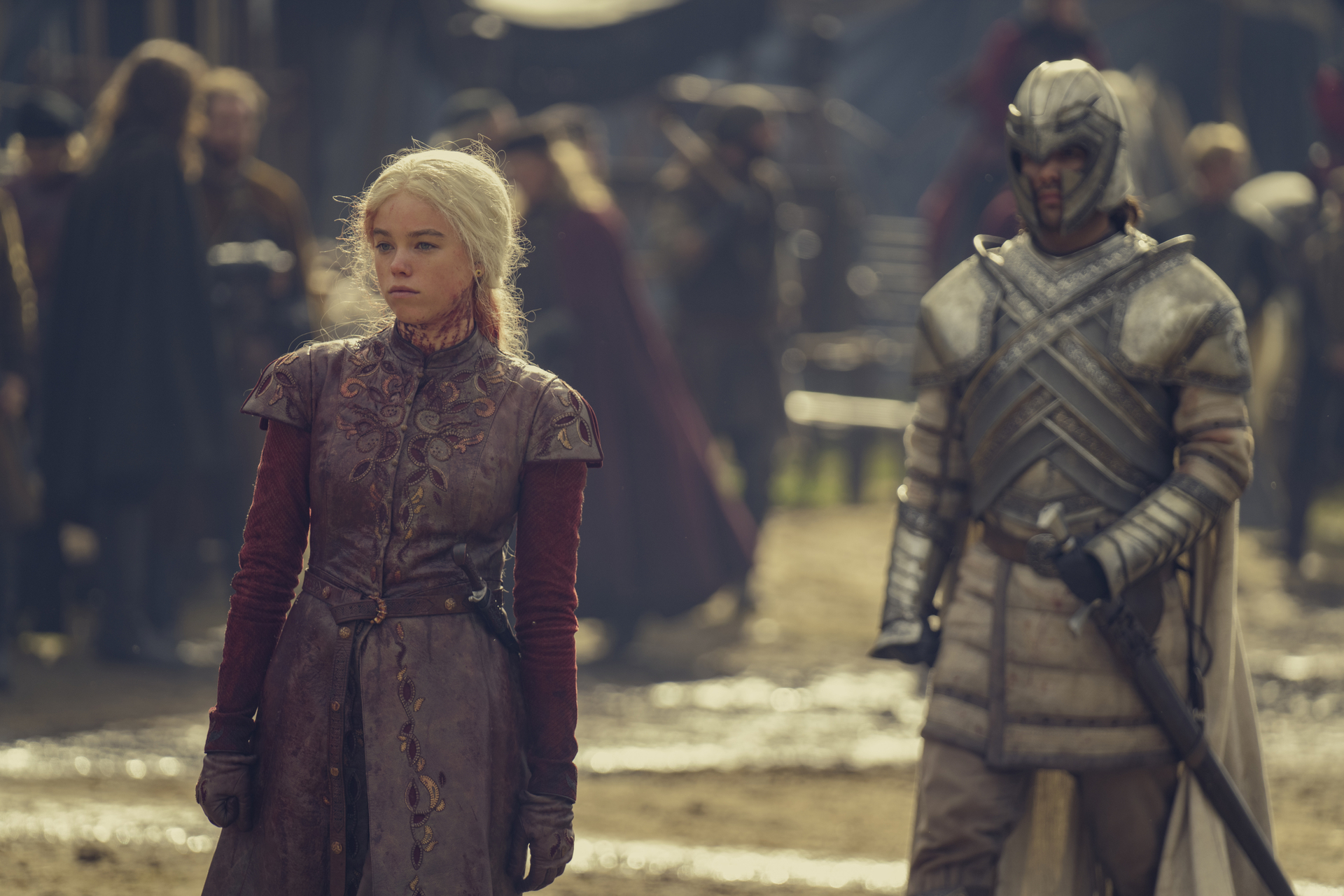
For anyone who has seen at least one season of Game of Thrones, it is clear what follows: dead king, power vacuum, civil war. The fact that after six episodes Viserys is still sitting on the throne, while the threats around him are multiplying (new claimants to the throne), is evidence of an ambition that should be applauded. Primarily because it works: G.R.R. Martin weaves before our eyes a world that is in balance, then finds a loose thread and pulls on it slowly until the whole warp falls apart. Viserys is essentially a mediocre king, more suitable for a constitutional monarchy: he puts off decisions until the last moment, and when he does decide something, he always changes the principles on which he acts, and the next decision will contradict the previous one.
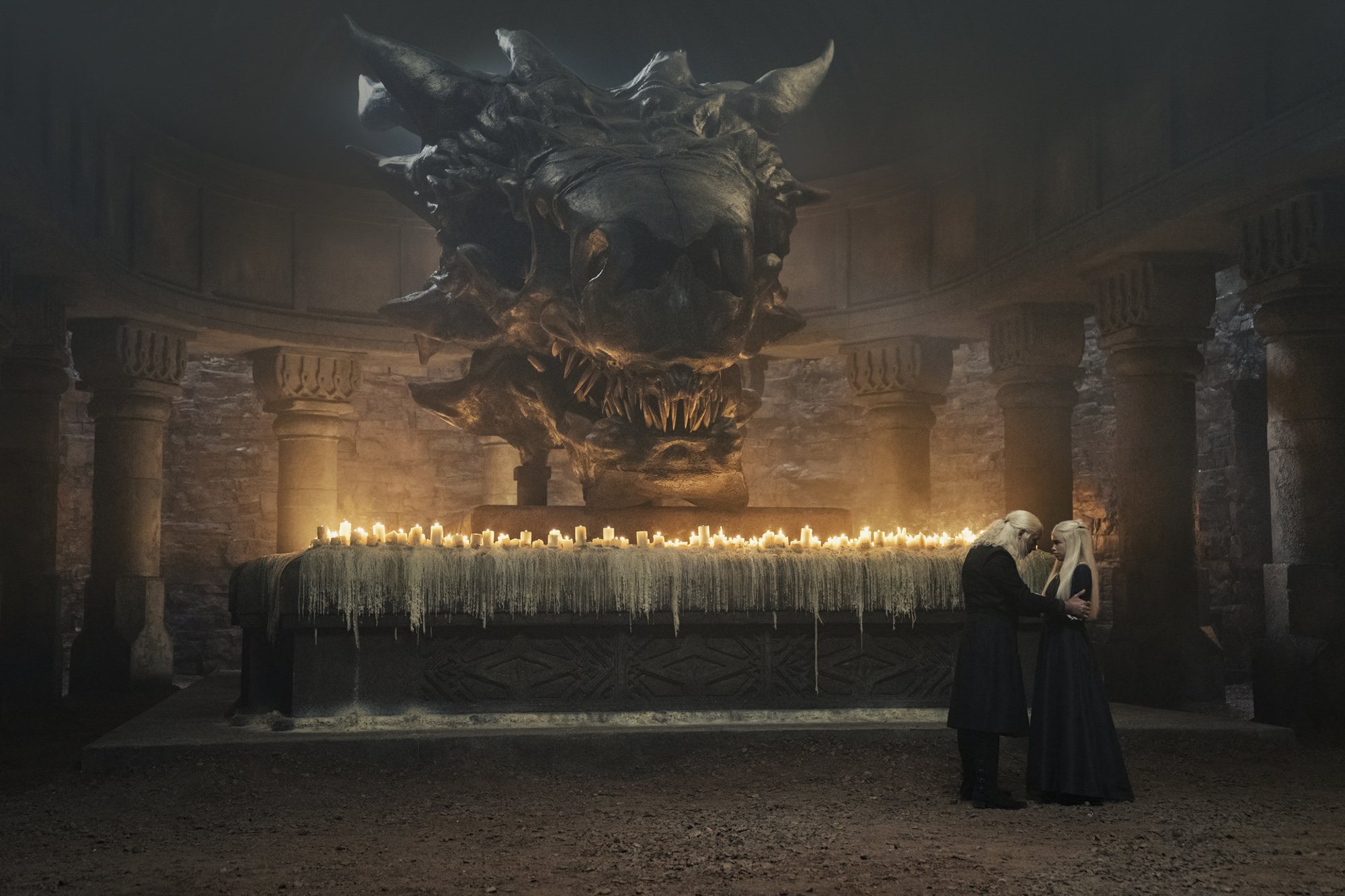
Then, another fact that should get credit is that House of the Dragon goes its own way (when it has a choice). Indeed, things seem to move more slowly here and the stakes, too, are more mundane – there are vague references to the apocalypse to come in GOT, but essentially we’re dealing with a medieval court drama, plus dragons. The characters are also less epic, they slide far more “randomly” between the different points on the path, they are alternately seduced by different life options, and their actions are more impulsive or at most tactical moves accompanied almost always by hesitation, change of heart, or dumb luck. It’s a big departure from the long-term strategies in the first series, where the main characters were either professional conspirators, driven by a strong code of conduct, or simply guided by the hand of fate (aka the author). In this way, their path was a predetermined one, camouflaged by the labyrinthine architecture of the plot and by Martin’s knack for eliminating his main characters, so as not to let certainties settle for the reader/viewer.
Now, House of the Dragon builds this labyrinth, it does not unveil it. I won’t say it’s better or worse than Game of Thrones, there are fewer likable characters and it lacks the epic scope anyway (just as you can’t compare Lord of the Rings to The Hobbit – we are going to overlook the fact that the latter itself is mediocre) – but so far I haven’t seen any faux pax, it seems like the best possible product that could grow in the shadow of a phenomenon like GOT.
House of the Dragon is streaming on HBO Max
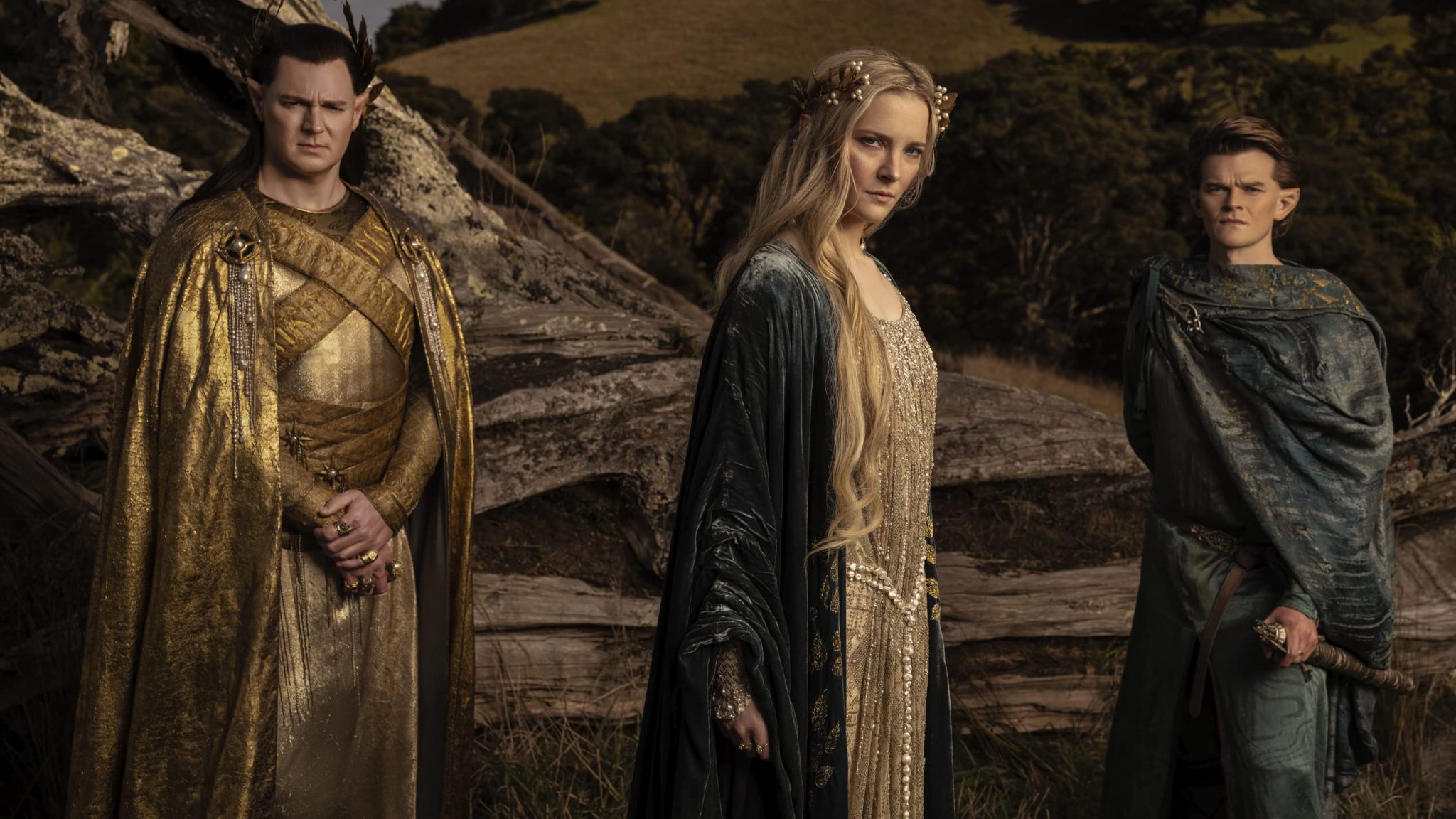
The Lord of the Rings: The Rings of Power (Patrick McKay, John D. Payne, 2022)
If the HBO series is elevated by G.R.R. Martin’s writing talent, The Rings of Power fails terribly due to J.R.R. Tolkien’s absence. And when I say absence, I don’t mean lack of talent, but the writer’s actual absence. Let’s go back a bit to the Jeff Bezos moment – there was definitely some ego there, but also what at the time could be seen as a risky move; still, in retrospect, it rather feels like a hoax.
Tolkien’s oeuvre – including the series of works updated, edited, and published posthumously by his son – is immense, and to understand the Amazon move, it must be considered in its entirety. Like Martin, but on a much larger scale, Tolkien created a universe with everything – geography, history, languages and alphabets, creation myths, humanoid races and nations, etc. That is, after all, the definition of high fantasy: the fantastic element doesn’t pertain to a particular story or to some character with magical powers, but to a world with no connection to the real one. It’s no wonder that an online giant with deep pockets would throw 250 million dollars even on a fragment of this universe; in streaming wars, it’s the franchises that constitute the avant-garde.
Amazon bought the television rights to The Lord of the Rings and The Hobbit, but one of the conditions imposed by the Tolkien Estate was that the series stay away from Peter Jackson’s films, as well as from Jackson himself (for a foray into the copyright maze and the subsequent trials click here). On the other hand, artistically speaking, making a series after the exact same events seemed like a wrong move anyway.
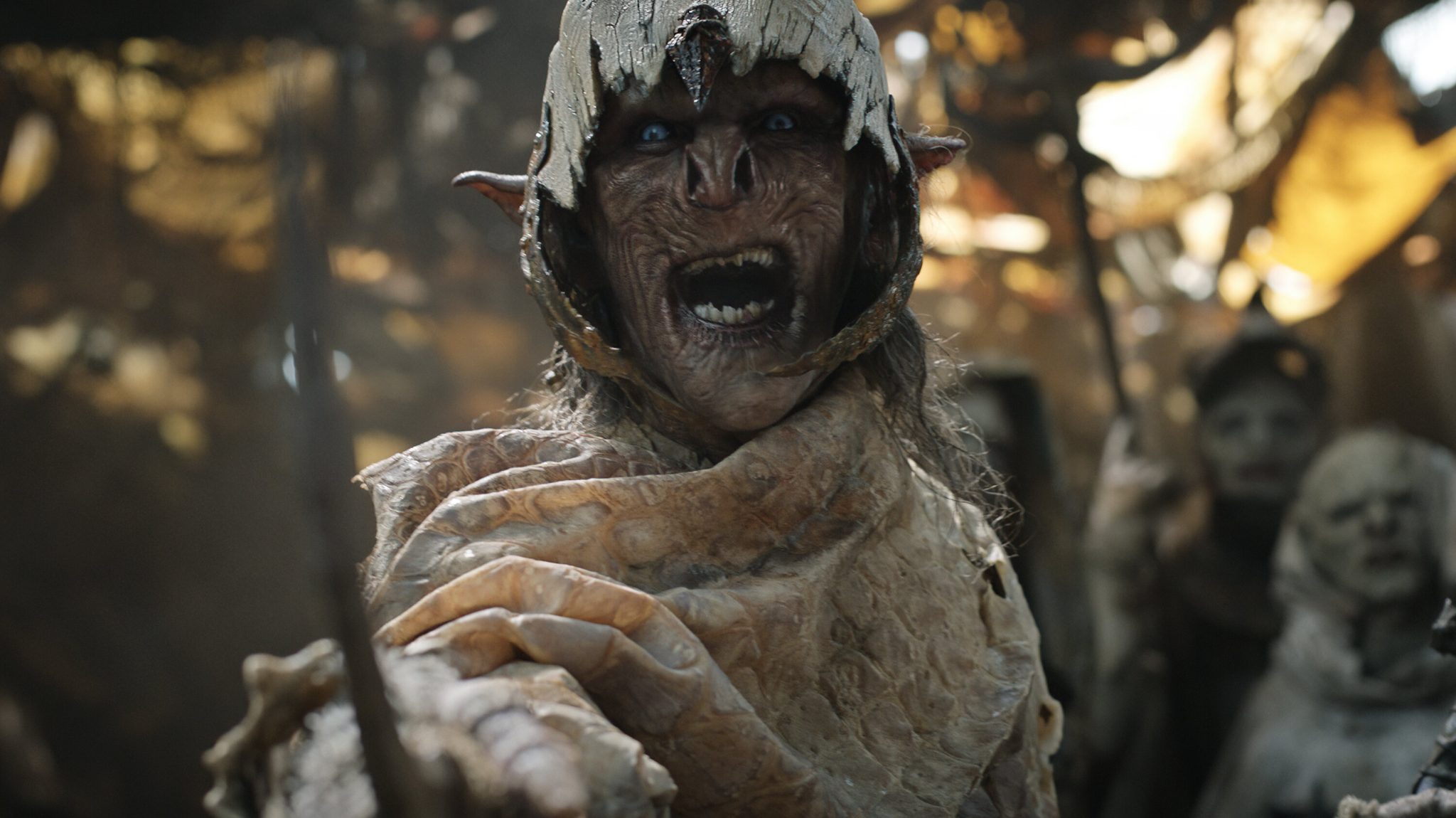
What then is left to use from the two novels? They can use the geographical-historical-human-linguistic universe we were talking about above. And many of the characters here have been roaming Middle Earth since at least the first confrontation with Sauron; their mere mention in the two books gives Amazon the right to use them. The problem is someone has to write lines and actions for these characters, and that someone obviously isn’t Tolkien. So Tolkien has no reason to be turning in his grave, but Peter Jackson is probably rolling on the couch laughing out loud.
If there is any cinematic enjoyment to The Rings of Power, it is rather thanks to Jackson. And here’s a lesson to be learned from House of the Dragon, which tried to break away from the GOT aesthetic wherever it could (they even redrew the dragons). The Amazon production, on the other hand, seeing that it was short of literary material to adapt, copied (successfully at times, but to what end?) the aesthetic decisions canonized by Peter Jackson: from the characters’ appearance to production design and costumes, they even approached Howard Shore to compose the music and went all the way to New Zealand for shootings.
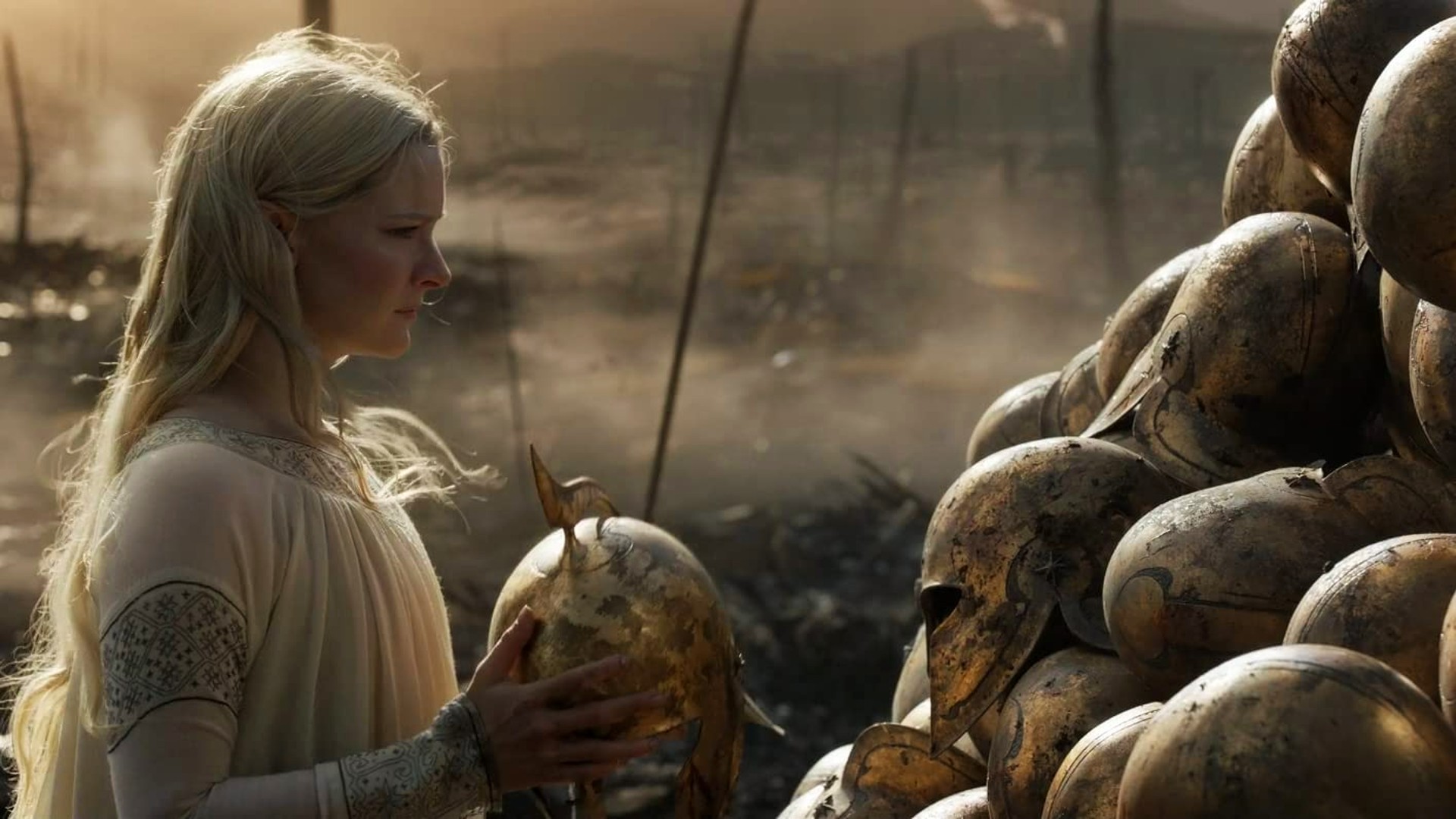
What The Rings of Power has been struggling with for 5 episodes – and it seems it will do so for 5 seasons at a cost that will exceed a billion – is precisely the 5-minute piece narrated by Galadriel (Cate Blanchet) that opens the saga directed by Peter Jackson. Obviously, the series also opens with a similar introductory voice-over, and those 5 minutes are probably the best of the entire season.
The main character is Galadriel herself, now played by Morfydd Clark; a capable actress by all appearances (but to be certain, she should also be given a script) and a bet won by the casting department (lucky for the series that she is also one of the characters already brought to life by Peter Jackson, they only had to find the right actress).
Galadriel has been hunting orcs for centuries, ever since the elves came to Middle Earth, and is obsessed with defeating Sauron once and for all, while the rest of the world wants to get on with their lives. There is also a personal trauma at play (as befits any superhero), and Galadriel knows no other way of existence than in armor. Obviously, she is right, the enemy forces are regrouping, turning to the well-known maneuvers: terrorizing the peasants, searching for evil artifacts, planning to forge rings of power.
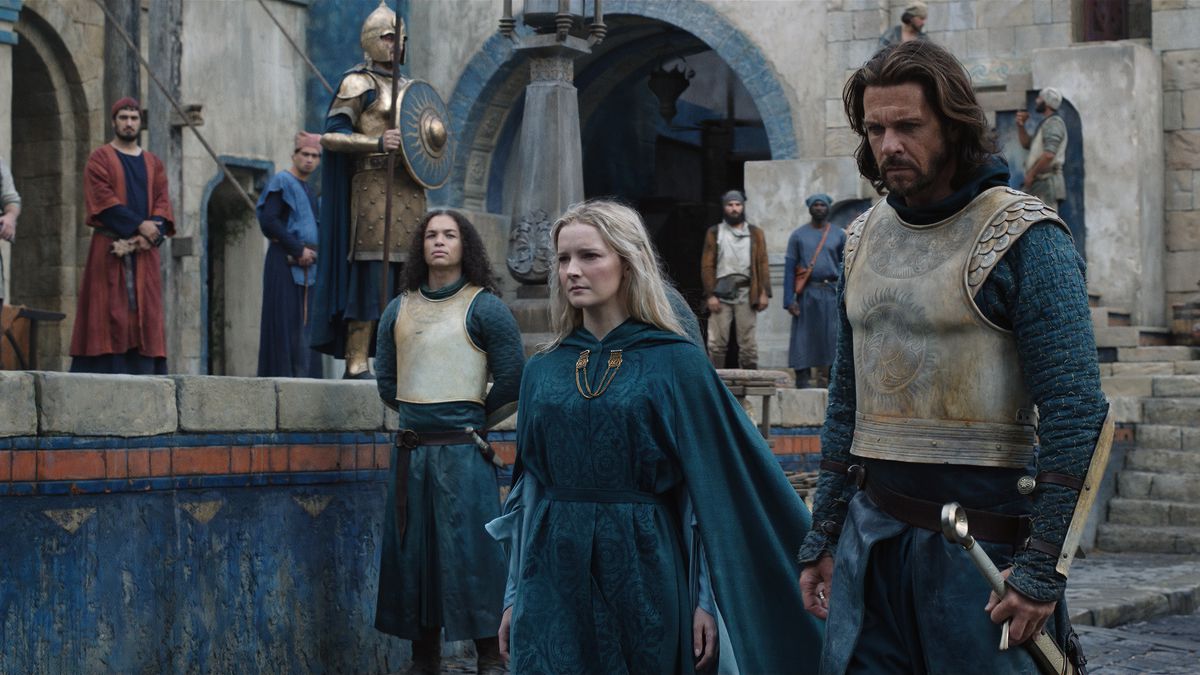
On the other side, Galadriel uses two unknown powers to build alliances and assemble an army: nagging and pronunciation. Episode after episode, the interactions between Galadriel and the other characters are based on her insistence and their refusal. On the other hand, Morfydd Clark, the lead actress, has a knack for delivering all of Tolkien’s invented names with the right accents, so much so that you’d think she came from there (as a rule, when it comes to both Tolkien and Matin, invented languages always sound tortured in all adaptations). Clark has enough charisma for 5 seasons, and that’s bad news to some degree – combined with the anti-woke hysteria surrounding the series, which would explain the negative reception, it’s enough to convince Amazon that they’re on the right track. They are not.
In fact, The Rings of Power is a perpetual departure, a preparation that never ends, hours of exposition in which the characters take a walk through the forest, escape and are caught again, argue a bit with each other, reconcile, and when they are ready to hit the road, the wagon wheel breaks or the ship catches on fire. The most irritating thing is that over all this preparation, troop movements and fiery calls to battle – and there are hardly any lines along the way (the dialogue is mostly atrocious) – there is always some epic music playing, which only invites the comparison with the big screen hit it emulates. Nothing epic here. Just an epic fail.
The Rings of Power is streaming on Amazon Prime
Film critic and journalist, UNATC graduate. Andrei Sendrea wrote for LiterNet, Gândul, FILM and Film Menu, and worked as an editor on the "Ca-n Filme" TV Show. In his free time, he works on his collection of movie stills, which he organizes into idiosyncratic categories. At Films in Frame, he writes the Watercooler Wednesdays column - the monthly top of TV shows/series.
